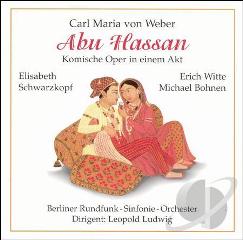Carl Maria von Weber - Abu Hassan (Ludwig) [2005]
Carl Maria von Weber - Abu Hassan (Ludwig) [2005]

1. Ouverture 3:52 2. Duett: Liebes Weibchen, Reiche Wein! 5:16 3. Arie: Ich Gebe Gasterein, Mit Liedern Und Mit Tanzen 6:50 4. Chor Der Glaubiger: Geld! Geld! Geld! 3:38 5. Duett: Tranen Sollst Du Nicht Vergiessen 6:21 6. Arie: Wird Nachtigall Wohl Trauern 4:18 7. Duett: Siehst Du Diese Grosse Menge 5:08 8. Terzett: Ich Such' Und Such' In Allen Ecken 4:40 9. Arie: Hier Liegt, Welch' Martervolles Los 3:56 10. Terzett: Angstlich Klopft Es Mir Im Herzen 6:57 11. Schluss Chor: Heil Ist Dem Haus Beschieden 0:45 Elisabeth Schwarzkopf – soprano Irmgard Seefried – mezzo-soprano Erich Witte – tenor Michael Bohnen – bass Berlin Radio Symphony Orchestra & Chorus Leopold Ludwig – conductor
Abu Hassan is a German singspiel in one act. It is a light, vivacious work that was highly successful at its Munich premier, which took place on June 4, 1811. Although there haven't been many modern performances, whenever it is staged it is well-received by the public. The libretto, written by Franz Carl Hiemer, was derived from Le dormier Eveille, or The Sleeper Awakened, by Antoine Galland. It is one of the tales of the Thousand and One Arabian Nights. These stories were brought to Europe by Galland in the early 1700s and published in several volumes. The Sleeper Awakened was not one of the original stories but was added later and opens Galland's twelfth volume of the set. The stories were extremely popular with eighteenth-century readers because of their exotic flavor and their frank discussion of sexual matters, fantasies, cruelty, and corruption. They also found favor with the romantics of Weber's generation, and influenced all types of art and theatrical entertainments. Weber's librettist only used the second half of the story. The entire story was used by the librettist of Giacomo Meyerbeer's 1815 Lustspiel Wirth und Gast.
The subject of this comic work concerns a debtor, Abu Hassan, and his wife Fatime, and their effort to outsmart the Caliph and gain from him the money allotted for their funerals so that they can pay their debts and live in ease. They are both beset by creditors as the opera opens, as was Weber at the time of its composition. Franz Carl Hiemer, a friend from Weber's Stuttgart days where they both had been frequently in debt, sent Weber the libretto in March of 1810. However, work did not begin on the opera until August of that same year. It was then that Weber began the working out of the creditor's chorus, "Geld! Geld! Geld!" a lively interpretation of the kind of creditors that were hounding Weber at the time. The rest of the numbers followed over several months, and the work was completed in January of 1811. There were a total of eight original pieces and an overture when the work was premiered. In 1813, Weber added a love duet for Abu Hassan and Fatime, to establish the closeness of their relationship. It is in a more serious style than the rest of the interplay that takes place between the scheming husband and wife, who banter about playfully through most of the opera. Nevertheless, it is still a lovely addition to the work. A solo lament for Fatime, which she sings as she tries to convince the Caliph's servant that her husband is indeed dead, was added for a Dresden revival in 1823. An extremely beautiful lament, it is also not quite of the same mood of the rest of the opera, which is lighthearted, sentimental, and comic.
Abu Hassan is characterized by richness and variety, and the influence of Mozart's Die Entfuhrung aus dem Serail is felt throughout. The characterizations are lively and keen, and the orchestra is handled deftly, with only a hint of Turkish elements added for that exotic flavor so loved by the Romantics. Both Fatime and Abu have solo arias with which to display their vocal expertise. Fatime's aria features a cello obbligato and plenty of opportunity for coloratura display, while Abu Hassan's is a complex structure composed of many parts. Two guitars and a comical bassoon accompany his posturing as he sings of his love for Fatime, but the piece closes with vocal virtuosics to rival those of his wife. --- Rita Laurance, Rovi
download: uploaded yandex 4shared mediafire solidfiles mega zalivalka filecloudio anonfiles oboom
Last Updated (Thursday, 03 July 2014 16:58)








